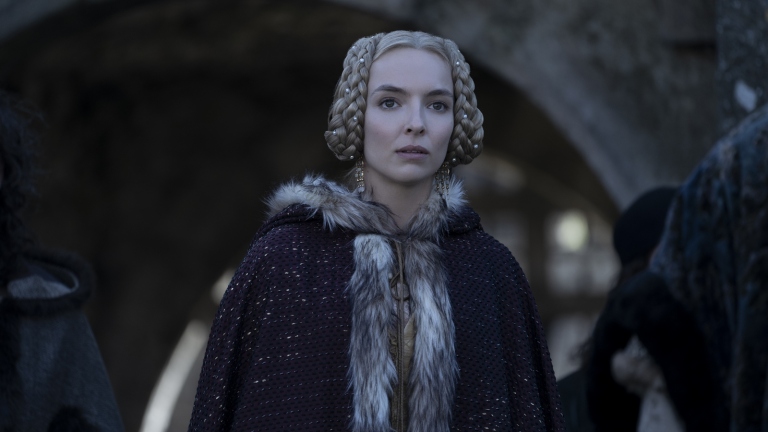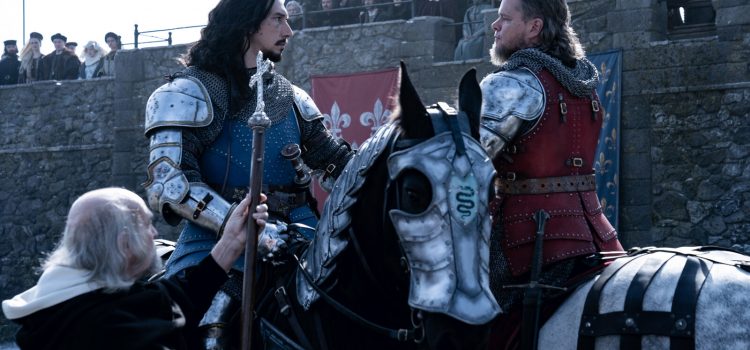By Alex McPherson
An ambitious historical epic with powerful performances, hard-hitting action sequences, and an intelligent condemnation of systemic injustice, director Ridley Scott’s “The Last Duel” approaches glory, but falls slightly short of achieving it.
Based on actual events and taking place in 14th century France, the film, broken into three sections, begins with Jean de Carrouges (Matt Damon, sporting an unfortunate hairdo), a valiant fighter serving under the cuckoo Count Pierre d’Alençon (Ben Affleck). De Carrouges, having lost his first wife and child from the plague, sees an opportunity to father an heir and inherit a large dowry, which includes a huge swathe of land. He weds Marguerite de Thibouville (Jodie Comer), the daughter of a wealthy-yet-disgraced nobleman. However, through a series of political maneuvers, longtime friend Jacques Le Gris (Adam Driver) ends up possessing a large portion of de Carrouges’ new land, gets promoted to captaincy over him, and rapes Marguerite when she’s alone at home. De Carrouges files lawsuit after lawsuit, eventually requesting a last duel to the death. Retribution for Marguerite’s rape isn’t de Carrouge’s primary motivation — it’s his own pride and “honor” that’s at stake.
We then see the same events from Le Gris’ point of view: he observes as the handsome, fun-loving squire who parties with the Count and helps him improve his fortunes (Le Gris can read and handle basic accountancy). He betters his own lot in life by currying favors. In this version, de Carrouges isn’t a brave warrior, but a bumbling fool. It’s all rather smooth sailing for Le Gris who, after the assault, is reassured from the Count and the clergy that there’s no way that Marguerite’s claims will be taken seriously.
Jump to section three, the most resonant of them all, and we watch the happenings unfold from Marguerite’s vantage point, getting a more intimate look at the horrible situation she’s become stuck in. She’s left feeling dehumanized and at the mercy of arrogant men whose final battle risks not only their lives, but her own as well.
Suffice to say, there’s plenty of anxious tension headed into the climactic confrontation, a bloody brawl that’s undoubtedly one of the best scenes of 2021. Beforehand, “The Last Duel” takes a creative approach to storytelling that fully fleshes out its subjects — the courageous Marguerite in particular. While Scott’s film isn’t especially profound in revealing that 14th century France was, in fact, horrendously unjust towards women, it slyly demonstrates how shifts in perspective can alter how we perceive the world, and the self-serving ways in which we might perceive ourselves.
Indeed, “The Last Duel” invites viewers to compare and contrast each party’s accounts of what took place, illustrating pertinent differences between them. Alterations in music, camera angles, and dialogue reveal the truth layer by layer, depending on who’s telling it, both serving to fill in narrative gaps and make the film feel decidedly stretched-out by the sword-clashing finale. The costuming and production design are incredibly detailed and period accurate, to be expected. The screenplay — co-written by Damon, Affleck, and Nicole Holofcener — highlights the egomania of de Carrouges and Le Gris, while occasionally throwing subtlety to the wind.
This episodic structure wouldn’t work if the actors weren’t in top form, and luckily, the whole cast delivers. Comer, bringing to life Marguerite’s kindness, trauma, and steadfast bravery in facing a system designed to subordinate her, is wholly deserving of accolades come awards season. Until the final act, she’s mostly relegated to the sidelines, but she conveys Marguerite’s weathered fearlessness through her facial expressions alone, infusing the film’s final stretch with true emotional gravitas.
Damon and Driver are similarly effective, albeit portraying more straightforward characters. There’s little redeeming either of them, no matter if we’re seeing through their eyes or not, but “The Last Duel” takes great lengths to show the patriarchal structures that inform their worldviews. Affleck almost seems like he’s in a different film, but it’s entertaining watching him embrace a demented frat boy persona as the Count, drunk on power along with alcohol.
Where the film stumbles involves Scott’s lack of restraint. Witnessing Marguerite’s assault — twice — comes across as exploitative rather than necessary. On one hand, “The Last Duel” paints similarities of Le Gris’ monstrous actions to the “playful” nights he enjoys with women in the Count’s chambers. On the other hand, when shown again through Marguerite’s frame of reference, it serves little purpose beyond shock value, fueling our anger leading into the titular showdown. In this case,“The Last Duel” uses her violation to artificially amplify dramatic stakes.
Although the film is ultimately uneven in execution, there’s still enough compelling characters to carry it through to its squirm-inducing conclusion. “The Last Duel” succeeds in demonstrating how the past informs the present, and the importance of recognizing how a core issue of the time — viewing women as property rather than human beings — continues in various insidious forms today. It’s also just a bone-crushing, suspenseful medieval thriller that prizes at least some brains over pure brawn.

“The Last Duel” is a 2021 drama directed by Ridley Scott and starring Matt Damon, Ben Affleck, Adam Driver and Jodie Comer. The run time is 2 hours, 32 minutes, and it is Rated R for strong violence including sexual assault, sexual content, some graphic nudity, and language. Alex’s Grade: B+

Lynn (Zipfel) Venhaus has had a continuous byline in St. Louis metro region publications since 1978. She writes features and news for Belleville News-Democrat and contributes to St. Louis magazine and other publications.
She is a Rotten Tomatoes-approved film critic, currently reviews films for Webster-Kirkwood Times and KTRS Radio, covers entertainment for PopLifeSTL.com and co-hosts podcast PopLifeSTL.com…Presents.
She is a member of Critics Choice Association, where she serves on the women’s and marketing committees; Alliance of Women Film Journalists; and on the board of the St. Louis Film Critics Association. She is a founding and board member of the St. Louis Theater Circle.
She is retired from teaching journalism/media as an adjunct college instructor.

